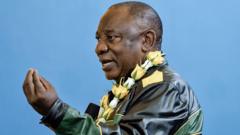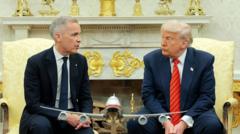With an agenda to mend US-South Africa relations during his White House visit, Ramaphosa faces the daunting task of addressing contentious narratives, particularly regarding claims of racial violence. Experts suggest that his diplomatic skills will be pivotal in achieving favorable outcomes while steering clear of emotionally charged confrontations.
Cyril Ramaphosa's Diplomatic Challenge: Navigating Tensions with Trump

Cyril Ramaphosa's Diplomatic Challenge: Navigating Tensions with Trump
As South African President Cyril Ramaphosa prepares for crucial talks with US President Donald Trump, the stakes are high amidst a backdrop of strained relations and controversial proclamations.
South African President Cyril Ramaphosa is set to meet with US President Donald Trump for discussions aimed at mending the increasingly strained relations between their nations. This will mark Ramaphosa's inaugural visit to the White House, where his renowned negotiation skills, shaped by his historic role in ending apartheid, will be put to the test in addressing a complex array of diplomatic tensions.
The nature of the visit comes amid a backdrop of contentious claims made by Trump concerning the plight of South Africa's Afrikaner population, which he has referred to as undergoing a “genocide.” Ramaphosa has acknowledged the necessity of an improved trade relationship, emphasizing the importance of a beneficial agreement to strengthen ties. "Trade relations will be the focal point of this meeting," Ramaphosa stated on his arrival in Washington, highlighting the urgency for a solid trade deal following prolonged tensions.
The political climate intensified significantly after Ramaphosa's government enacted legislation allowing for the expropriation of land without compensation, intended to rectify historical injustices against the Black population. This move has drawn ire from the Trump administration, particularly following the suspension of US aid to South Africa and Trump's invitation to Afrikaners facing hardship to migrate to the US.
Political analyst Anthoni van Nieuwkerk has characterized Ramaphosa's decision to engage with Trump as a "high-risk strategy," forecasting two potential outcomes from the meeting: a cordial and productive engagement, or a scenario clouded by emotionally charged rhetoric that could lead to a public relations debacle for the South African leader. He emphasized that if the meeting devolves into discussions centered on claims of genocide, it could undermine the delicate diplomatic endeavor Ramaphosa seeks to foster.
The South African delegation, which includes several senior cabinet ministers, has descended on the US with hopes of establishing common ground, and there are plans to extend the African Growth and Opportunity Act (Agoa) that allows for duty-free exports from Africa to the US. Currently, South Africa is a significant participant in this program, contributing billions in revenue through exports of vehicles and precious metals.
However, uncertainty looms around the possible renewal of Agoa, and South Africa's leadership is preparing for rigorous negotiations to secure continued advantages in trade. Their message is clear: South Africa approaches this meeting as an equal partner, asserting its sovereignty and the right to chart its domestic policies without external interference.
Agriculture Minister John Steenhuisen's presence in the delegation underlines an internal dynamic, as his party has been critical of the ANC's governance; this could add another layer of complexity to their discussions with the Trump team.
Despite reservations regarding the outcomes of the meeting, Ramaphosa is optimistic that engaging directly with Trump could assuage misunderstandings, potentially allowing for frank conversations about the humanitarian crises affecting both the US and South Africa. By extending an invitation for an informal round of golf during the upcoming G20 Summit in South Africa, Ramaphosa may seek a more personal connection to enhance diplomatic relations.
In conclusion, as South Africa's leadership embarks on this pivotal journey to the US, the outcome could significantly influence future collaboration between the two nations, especially concerning economic and humanitarian issues. The meeting marks not just a critical diplomatic effort but a moment of potential reconciliation amid a challenging socio-political landscape.



















